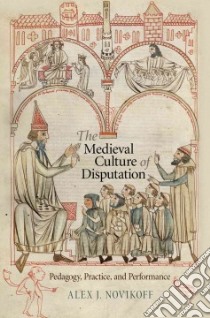The Medieval Culture of Disputation - 9780812245387
Un libro in lingua di Novikoff Alex J. edito da Univ of Pennsylvania Pr, 2013
- € 93.10
- Il prezzo è variabile in funzione del cambio della valuta d’origine
Scholastic disputation, the formalized procedure of debate in the medieval university, is one of the hallmarks of intellectual life in premodern Europe. Modeled on Socratic and Aristotelian methods of argumentation, this rhetorical style was refined in the monasteries of the early Middle Ages and rose to prominence during the twelfth-century Renaissance. Strict rules governed disputation, and it became the preferred method of teaching within the university curriculum and beyond. In The Medieval Culture of Disputation, Alex J. Novikoff has written the first sustained and comprehensive study of the practice of scholastic disputation and of its formative influence in multiple spheres of cultural life.
Using hundreds of published and unpublished sources as his guide, Novikoff traces the evolution of disputation from its ancient origins to its broader impact on the scholastic culture and public sphere of the High Middle Ages. Many examples of medieval disputation are rooted in religious discourse and monastic pedagogy: Augustine's inner spiritual dialogues and Anselm of Bec's use of rational investigation in speculative theology laid the foundations for the medieval contemplative world. The polemical value of disputation was especially exploited in the context of competing Jewish and Christian interpretations of the Bible. Disputation became the hallmark of Christian intellectual attacks against Jews and Judaism, first as a literary genre and then in public debates such as the Talmud Trial of 1240 and the Barcelona Disputation of 1263. As disputation filtered into the public sphere, it also became a key element in iconography, liturgical drama, epistolary writing, debate poetry, musical counterpoint, and polemic. The Medieval Culture of Disputation places the practice and performance of disputation at the nexus of this broader literary and cultural context.
Informazioni bibliografiche
- Titolo del Libro in lingua: The Medieval Culture of Disputation
- Sottotitolo: Pedagogy, Practice, and Performance
- Lingua: English
- Autore: Novikoff Alex J.
- Editore: Univ of Pennsylvania Pr
- Collana: Univ of Pennsylvania Pr (Hardcover)
- Data di Pubblicazione: 03 Ottobre '13
- Genere: HISTORY
- Argomenti : Civilization, Medieval 12th century Civilization, Medieval 13th century Learning and scholarship Europe History Medieval, 500-1500
- Pagine: 327
- Dimensioni mm: 228 x 152 x 0
- EAN-13: 9780812245387


